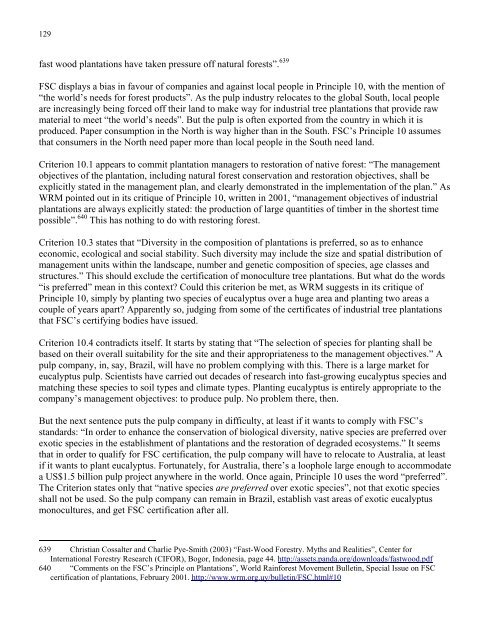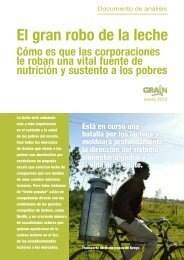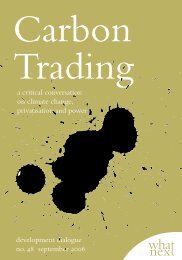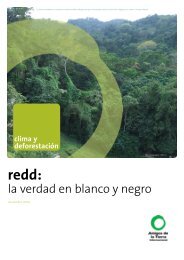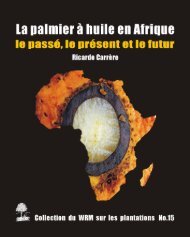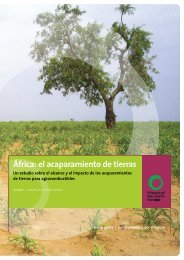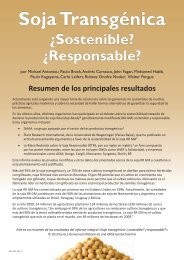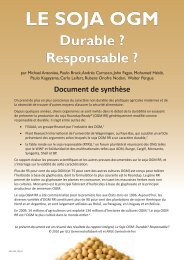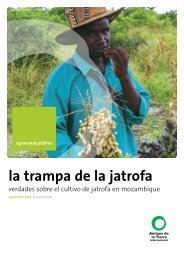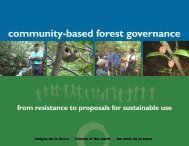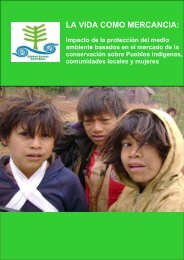Plantations, poverty and power - Critical Information Collective
Plantations, poverty and power - Critical Information Collective
Plantations, poverty and power - Critical Information Collective
Create successful ePaper yourself
Turn your PDF publications into a flip-book with our unique Google optimized e-Paper software.
129<br />
fast wood plantations have taken pressure off natural forests”. 639<br />
FSC displays a bias in favour of companies <strong>and</strong> against local people in Principle 10, with the mention of<br />
“the world’s needs for forest products”. As the pulp industry relocates to the global South, local people<br />
are increasingly being forced off their l<strong>and</strong> to make way for industrial tree plantations that provide raw<br />
material to meet “the world’s needs”. But the pulp is often exported from the country in which it is<br />
produced. Paper consumption in the North is way higher than in the South. FSC’s Principle 10 assumes<br />
that consumers in the North need paper more than local people in the South need l<strong>and</strong>.<br />
Criterion 10.1 appears to commit plantation managers to restoration of native forest: “The management<br />
objectives of the plantation, including natural forest conservation <strong>and</strong> restoration objectives, shall be<br />
explicitly stated in the management plan, <strong>and</strong> clearly demonstrated in the implementation of the plan.” As<br />
WRM pointed out in its critique of Principle 10, written in 2001, “management objectives of industrial<br />
plantations are always explicitly stated: the production of large quantities of timber in the shortest time<br />
possible”. 640 This has nothing to do with restoring forest.<br />
Criterion 10.3 states that “Diversity in the composition of plantations is preferred, so as to enhance<br />
economic, ecological <strong>and</strong> social stability. Such diversity may include the size <strong>and</strong> spatial distribution of<br />
management units within the l<strong>and</strong>scape, number <strong>and</strong> genetic composition of species, age classes <strong>and</strong><br />
structures.” This should exclude the certification of monoculture tree plantations. But what do the words<br />
“is preferred” mean in this context Could this criterion be met, as WRM suggests in its critique of<br />
Principle 10, simply by planting two species of eucalyptus over a huge area <strong>and</strong> planting two areas a<br />
couple of years apart Apparently so, judging from some of the certificates of industrial tree plantations<br />
that FSC’s certifying bodies have issued.<br />
Criterion 10.4 contradicts itself. It starts by stating that “The selection of species for planting shall be<br />
based on their overall suitability for the site <strong>and</strong> their appropriateness to the management objectives.” A<br />
pulp company, in, say, Brazil, will have no problem complying with this. There is a large market for<br />
eucalyptus pulp. Scientists have carried out decades of research into fast-growing eucalyptus species <strong>and</strong><br />
matching these species to soil types <strong>and</strong> climate types. Planting eucalyptus is entirely appropriate to the<br />
company’s management objectives: to produce pulp. No problem there, then.<br />
But the next sentence puts the pulp company in difficulty, at least if it wants to comply with FSC’s<br />
st<strong>and</strong>ards: “In order to enhance the conservation of biological diversity, native species are preferred over<br />
exotic species in the establishment of plantations <strong>and</strong> the restoration of degraded ecosystems.” It seems<br />
that in order to qualify for FSC certification, the pulp company will have to relocate to Australia, at least<br />
if it wants to plant eucalyptus. Fortunately, for Australia, there’s a loophole large enough to accommodate<br />
a US$1.5 billion pulp project anywhere in the world. Once again, Principle 10 uses the word “preferred”.<br />
The Criterion states only that “native species are preferred over exotic species”, not that exotic species<br />
shall not be used. So the pulp company can remain in Brazil, establish vast areas of exotic eucalyptus<br />
monocultures, <strong>and</strong> get FSC certification after all.<br />
639 Christian Cossalter <strong>and</strong> Charlie Pye-Smith (2003) “Fast-Wood Forestry. Myths <strong>and</strong> Realities”, Center for<br />
International Forestry Research (CIFOR), Bogor, Indonesia, page 44. http://assets.p<strong>and</strong>a.org/downloads/fastwood.pdf<br />
640 “Comments on the FSC’s Principle on <strong>Plantations</strong>”, World Rainforest Movement Bulletin, Special Issue on FSC<br />
certification of plantations, February 2001. http://www.wrm.org.uy/bulletin/FSC.html#10


